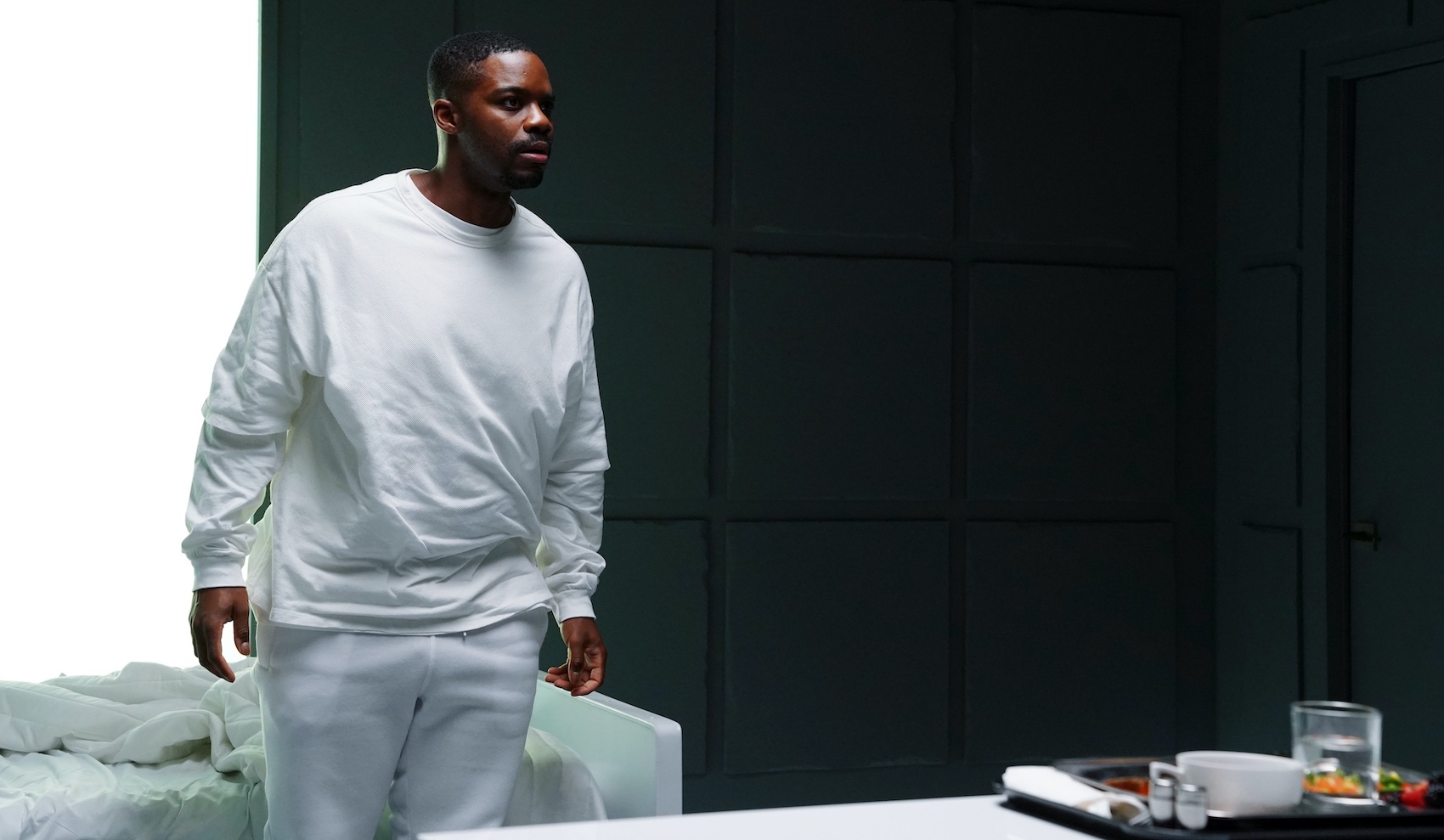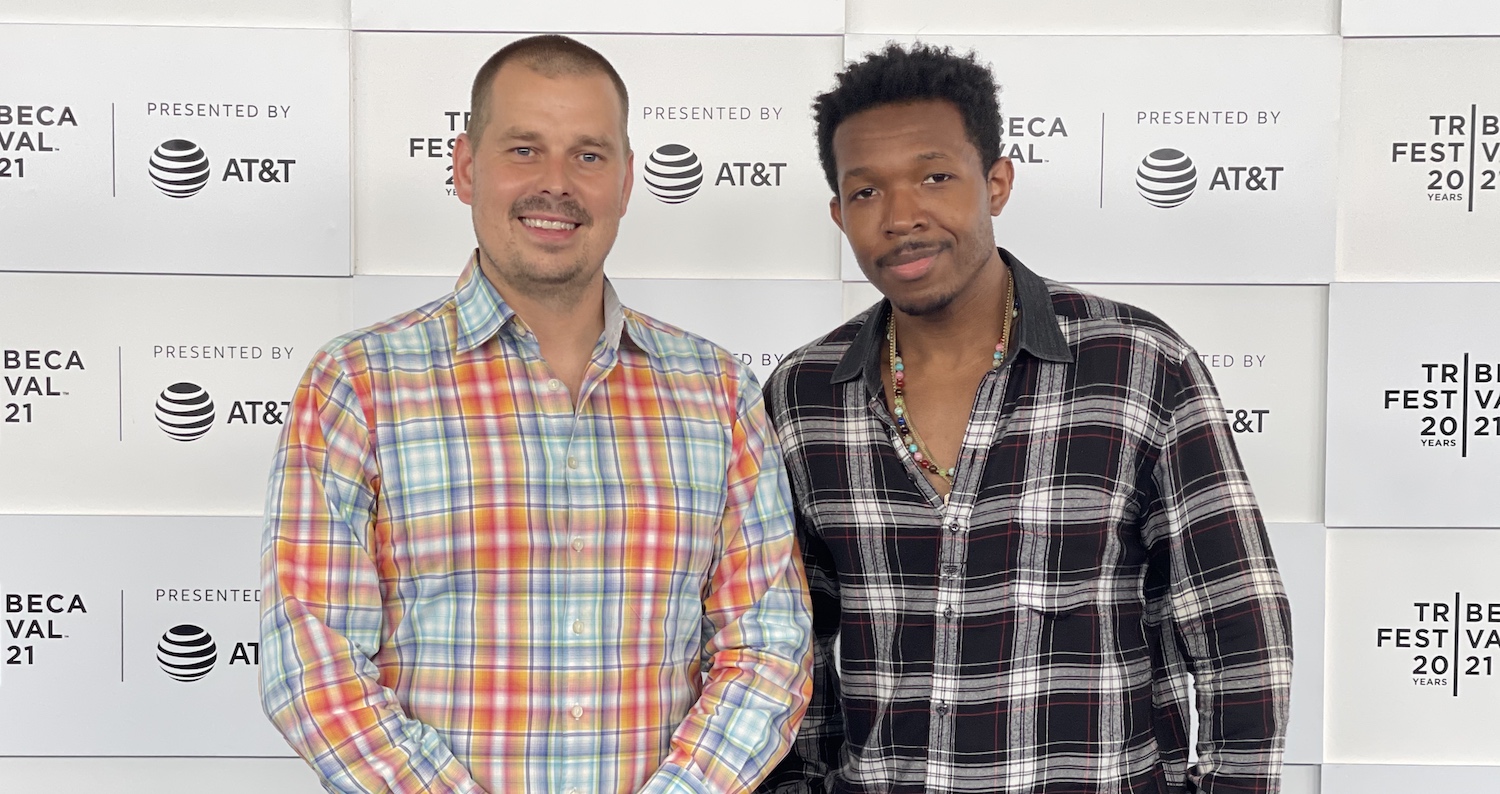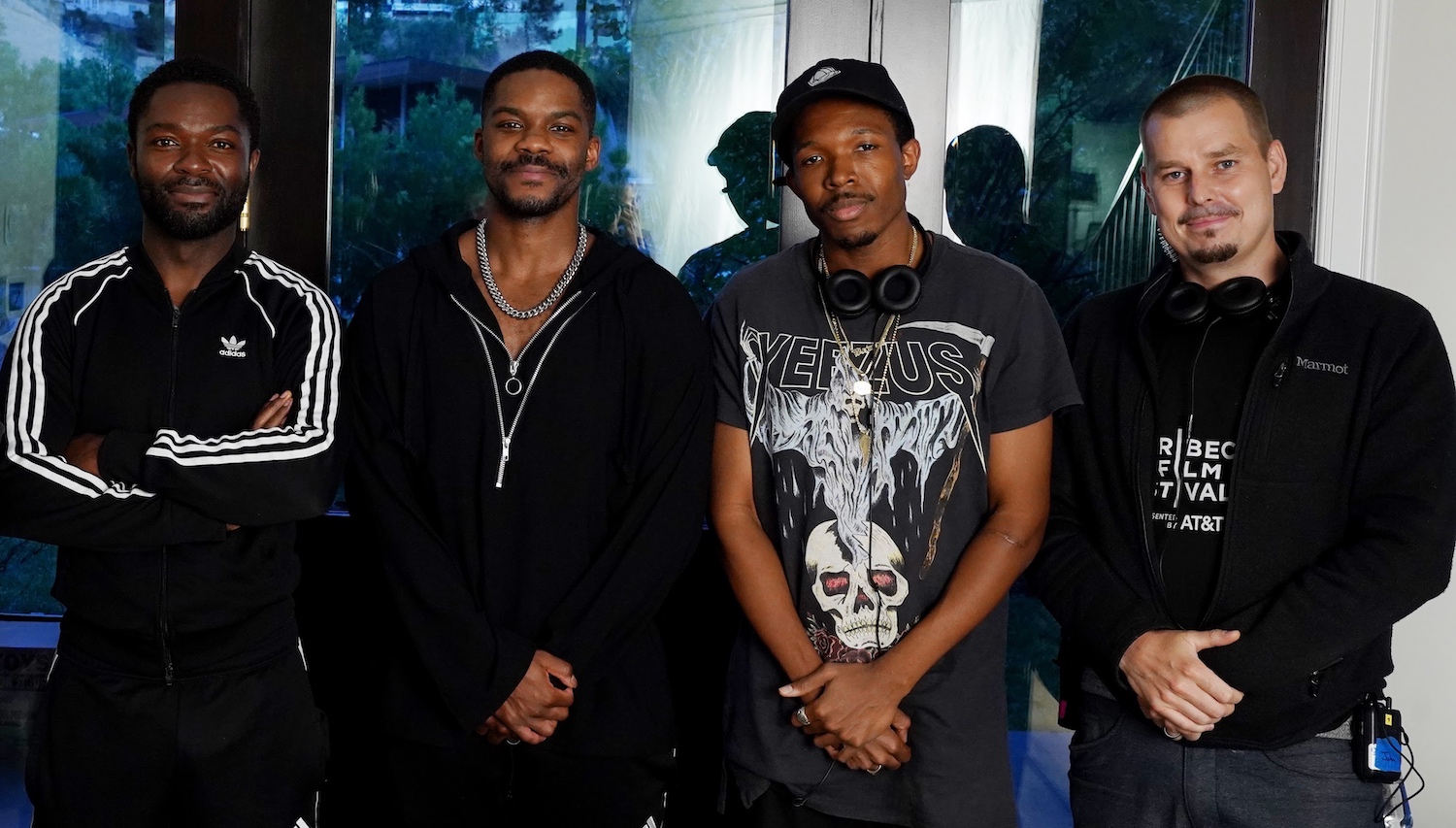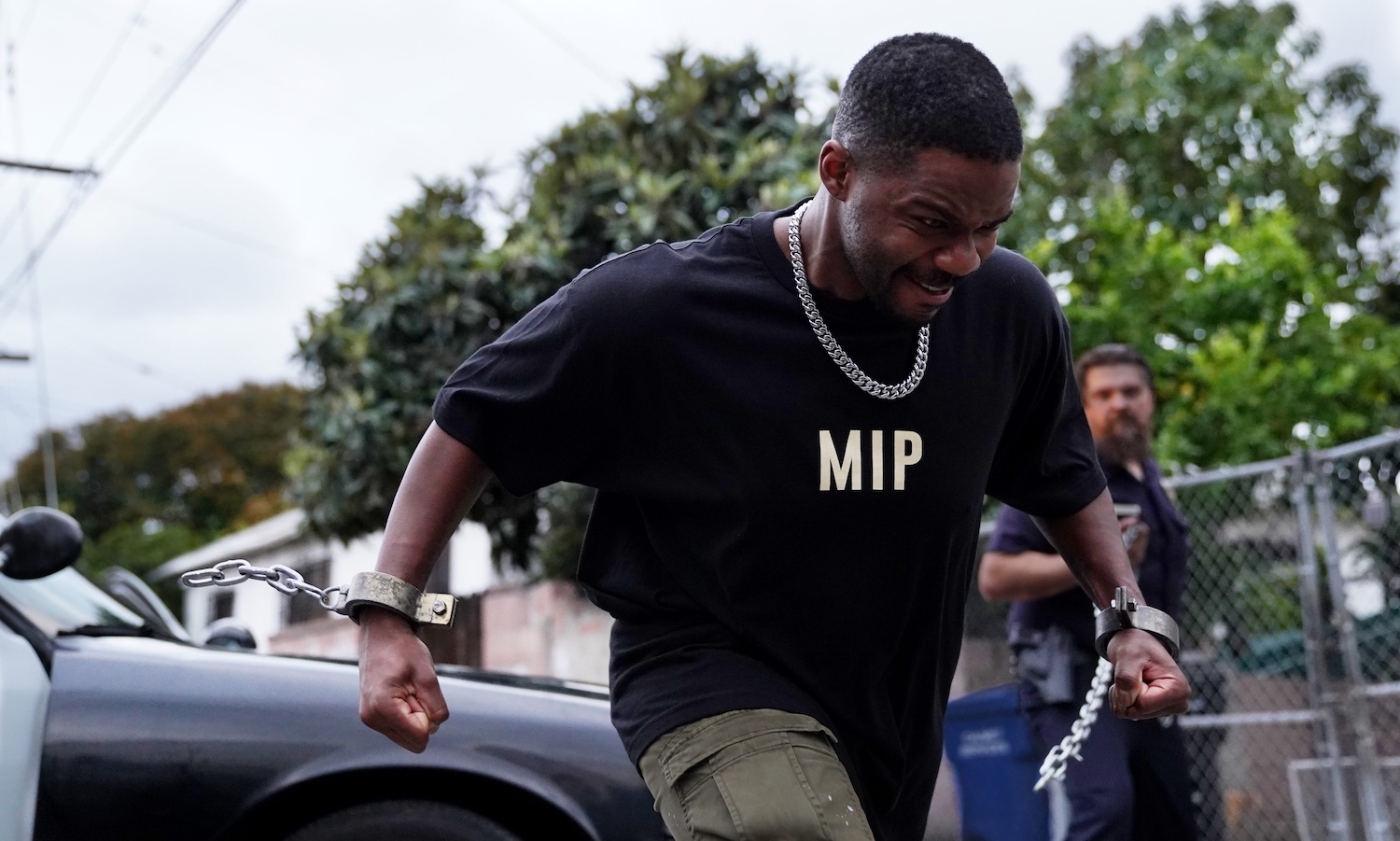After 20 years of experience as an actor in projects ranging from short films (U Shoot Videos?), TV shows (The Purge) and Hollywood blockbusters (Black Panther), Denzel Whitaker is making his mark behind the camera as a writer-director. For his latest project, he teamed up with S/W multi-alum John Trefry (Stucco, How To Be Alone, Souls Of Totality) to co-write and make 5150, a short film intended to be turned into a series, which is released online today:
5150 tells the story of a world-famous black celebrity who is detained at a mysterious psychiatric facility following his erratic behavior and political activism. Executive produced by David Oyelowo (Selma), the short film stars Jovan Adepo (Fences, Watchmen) in a role that bears an uncanny resemblance to Kanye West, and deals with the power of modern celebrity in our culture, mental health in the black community and the complexities of race in America. Tackling many different topics within a smorgasbord of ideas, tones and styles–from fake TV-clip montage to stylized conspiracy psycho-thriller–that can seem exciting to some and all over the place to others, 5150 is nonetheless an ambitious project and was recently featured at this year’s Tribeca Creators Market.
In our interview, Denzel and John talk about the differences between an independent pilot and a proof-of-concept short, their hopes for the democratization of the creative process and their optimistic outlook on the possibilities for aspiring filmmakers and marginalized voices within the industry.
When I first saw 5150, I regarded it as an independent pilot, and now you’re calling it a short film, or even a “teaser” in your press materials. What would you say are the differences, and why is that distinction important for you with the project?
John Trefry: The process of creating a short film to a series is very novel. It’s something that not a lot of creators have done or really do, but the clarification for us is that we wrote and produced 5150 as a short film. It was intended to be something that was self-contained as a story and had a beginning, middle and end, and could function on its own as such, as a short film.
“This is not a full episode. And so we’re not comfortable really calling it a pilot”
Both Denzel and myself are really passionate about the short film format. And so that’s how we pitched it to actors and crew. But the reason that we really distinguished from a pilot for example, is that we do intend for the larger story of 5150 to be a series.
However, this is not a full episode. And so we’re not comfortable really calling it a pilot. And we really have struggled with what to call it because it is intended to be a proof of concept for a series. It’s meant to show audiences as well as the industry, here’s the look and feel, and introducing the world and the characters of what we envisioned the larger 5150 series to explore.

Jovan Adepo in 5150
Denzel Whitaker: The thing I could say and double back on is that both John and I got our start in short films. And especially being scrappy young filmmakers, like many filmmakers who start with short films, you create something small and contained, but you always hope for it to do something larger. So, as John has described, the pathway from short films to television series is a little bit more novel than from short films to feature films–we’ve seen that lane before.
So it’s been really interesting, just the feedback we’ve received, making a short film and now turning it into a TV series, because we feel like we’re walking on uncharted land that most people haven’t walked before. But at the end of the day, short films are our passion and blood, it’s the creation, and it’s the start, and it’s the humble roots of every indie filmmaker. So we are really excited about that, and that’s why we champion it as a short.
You had 5150 at this year’s Tribeca Creators Market: what did you gain from that experience and what are your hopes for the online release of the film? What are the advantages of getting the series off the ground by releasing the short film online?
John Trefry: The Creators Market for us was really a new experience because the format was so targeted to connect with industry representatives, studio executives, folks from other production companies, management, et cetera. And it was really about creating those conversations.
What we found from that experience was there was a ton of goodwill and interest in the materials that we had created, i.e. the short film as a proof of concept, to really demonstrate our story, and Denzel’s directing. And the Creators Market was a really good way to show the industry that it’s not just a pilot script, which we have written, but it’s also this short that we went out and produced on our own–actually in the middle of the pandemic, which was really challenging.

John Trefry and Denzel Whitaker at the Tribeca Creators Market
And then in terms of our hopes for the release, we hope it will help us on the journey to bringing the series to life. We’ve had a lot of exciting experiences with releasing short films online. Will “The Machine” is a project that Denzel and I have done together previously, a short film. And also, other short film projects like Stucco, or How To Be Alone, or Souls Of Totality. We’ve seen really great audience reaction and response with partnering with folks like Short of the Week, where we can get our work in front of audiences and ultimately as filmmakers, that’s our goal.
“We made it. We want to get it in front of people and have them experience it”
And so we think that by allowing audiences to see this short film, and introducing the world and the characters, we want to really empower them. We want to get feedback and hear what people think. And ultimately, we view that as a way to kind of democratize the process of getting the series made. Where instead of it all happening behind closed doors, where you may create a sizzle or a short proof of concept that is never released publicly. We thought this is a really timely story. There’s a lot of stuff that we think is really relevant right now and is about social movements and racial justice, for example.
We think it’s really cool to put that back in front of audiences and use it as a way to just improve ourselves as storytellers, and hone and craft what we think the ultimate story of 5150 is. That’s the beauty of the short film ecosystem, right? Where you can connect with audiences all over the world and you don’t have to wait for somebody to green-light you, if you will–we already did the hard work. We made it. We want to get it in front of people and have them experience it.
Can you tell me a bit about the behind-the-scenes of the film in general, how your collaboration started with this particular project. As you said, it’s a testament to just green-lighting yourself. At the same time you have people like David Oyelowo producing and Jovan Adepo in the lead role. How did you manage to get all these people on board? And for aspiring filmmakers, maybe if you can explain, how did you get the “industry interests” from the start?
Denzel Whitaker: So John and I both met back in 2018 on this project called Will ‘The Machine’, as he mentioned earlier. I was starring as an actor and was an executive producer, and John produced it along with his production company 4WT Media.
As an actor, I’ve been in front of the camera for 20 plus years. So I kind of understand that dynamic and scope of the world, but what people don’t really realize, especially for a lot of actors who jump behind the camera, it’s almost like restarting your whole career over again. Many of my peers who take that plunge are so used to this lofty high idea of what they might’ve experienced on bigger budget projects, that really, once you get back into the weeds of the indie world, you have to get scrappy again, you have to sacrifice certain luxuries.
“Every single shot you don’t take you miss. So you got to shoot your shot”
That’s one of the things that John and I really champion ourselves, that we are willing to get a little bit scrappy. We’re willing to forego some of those luxuries just to get our project made. And that’s really the intention that John and I set from the get-go.
So again, we asked ourselves how we could use these resources that are already within our pocket? And that’s the thing: I understand the advantage that I have of putting 20 plus years in front of the camera that allowed me to get in front of people like Jovan Adepo and David Oyelowo.

Executive producer David Oyelowo, actor Jovan Adepo, director Denzel Whitaker and producer John Trefry on the set of 5150
But what I would almost say to any young, emerging, budding filmmaker is: take a chance. Because for the same reason I was able to maybe go to an event and meet these people, I’ve had other young filmmakers reach out to me on Instagram, or they would reach out to me via email through my company. You never know where somebody’s headspace is. And so, I like to tell young filmmakers or anybody who’s just trying to get their shot is: shoot your shot. Every single shot you don’t take you miss. So you got to shoot your shot.
Now’s the time where more and more people who haven’t been heard are getting inside the door, and more and more topics that haven’t been dealt with are having a light shone on them. How does your project fit in with that development?
Denzel Whitaker: The beautiful thing about the internet, and the gift and the curse of it, is that we as humans have invented something so complex, we still don’t know the extent of it. The reason why I lead with that is because the birth of the internet has allowed just so many creators, new tools, and new resources, and new outlets that weren’t previously there. Had John and I tried to make 5150, maybe 20, 30 years ago, the technology or the outlets wouldn’t have been there. And so the game is consistently changing.
“The door is open right now. And if you got a foot at the crack of that door, go ahead and kick it open”
And especially for people of color, what we’ve experienced within the pandemic, especially with the Black Lives Matter movement, and standing up for Stop Asian Hate, and all of the various movements of various cultures. Our voices are now being magnified in a way that they weren’t before and that’s a beautiful thing. And I encourage and empower everyone, no matter what denomination or delineation you come from: get out there, shine your voice, tell your story. The door is open right now. And if you got a foot at the crack of that door, go ahead and kick it open.

Jovan Adepo in 5150
John Trefry: Yeah. And to your question about this feeling like it’s a really big project and getting big industry people involved. Make no mistake, this is really as scrappy and as indie as it gets. And the way we were able to really do that, to kind of bridge that gap between the indie short-film world and traditional Hollywood, is really just through conviction. That’s what attracted people like David Oyelowo and Jovan Adepo, and that’s what has continued to really be our guiding light. Even though Denzel is really known as an actor and I’ve been working professionally as a filmmaker for over a decade, we’re really reintroducing ourselves to the industry as emerging television creators. That’s really hard. It’s a really, really competitive landscape out there.
We believe in the collaborative nature and the open nature of filmmaking. I think, as Denzel described, this is a new wave of inclusivity and really having a big tent for everybody to have a place to tell their stories. We believe that our difference in backgrounds, for example, is one of our strengths as a creative team.
“It just creates a more inclusive, more diverse and richer film community where lots of people have the opportunity to have their stories be heard”
And we’re really committed to telling new stories, because we don’t want to just play it safe. We want to be bold. We want to take chances. And that’s ultimately why we think that doing this, telling the story this way and getting the short film, 5150, out to audiences is really in alignment with our values and what we believe.
Because we want audiences to be part of the journey with us. And ultimately, we believe that the more we can all kick the door open together and really provide opportunities for one another, it just benefits everybody. And it just creates a more inclusive, more diverse and richer film community where lots of people have the opportunity to have their stories be heard.
I think that’s a perfect point to end on. Thank you so much.
Parts of the interview have been edited for brevity and clarity.
 Georg Csarmann
Georg Csarmann